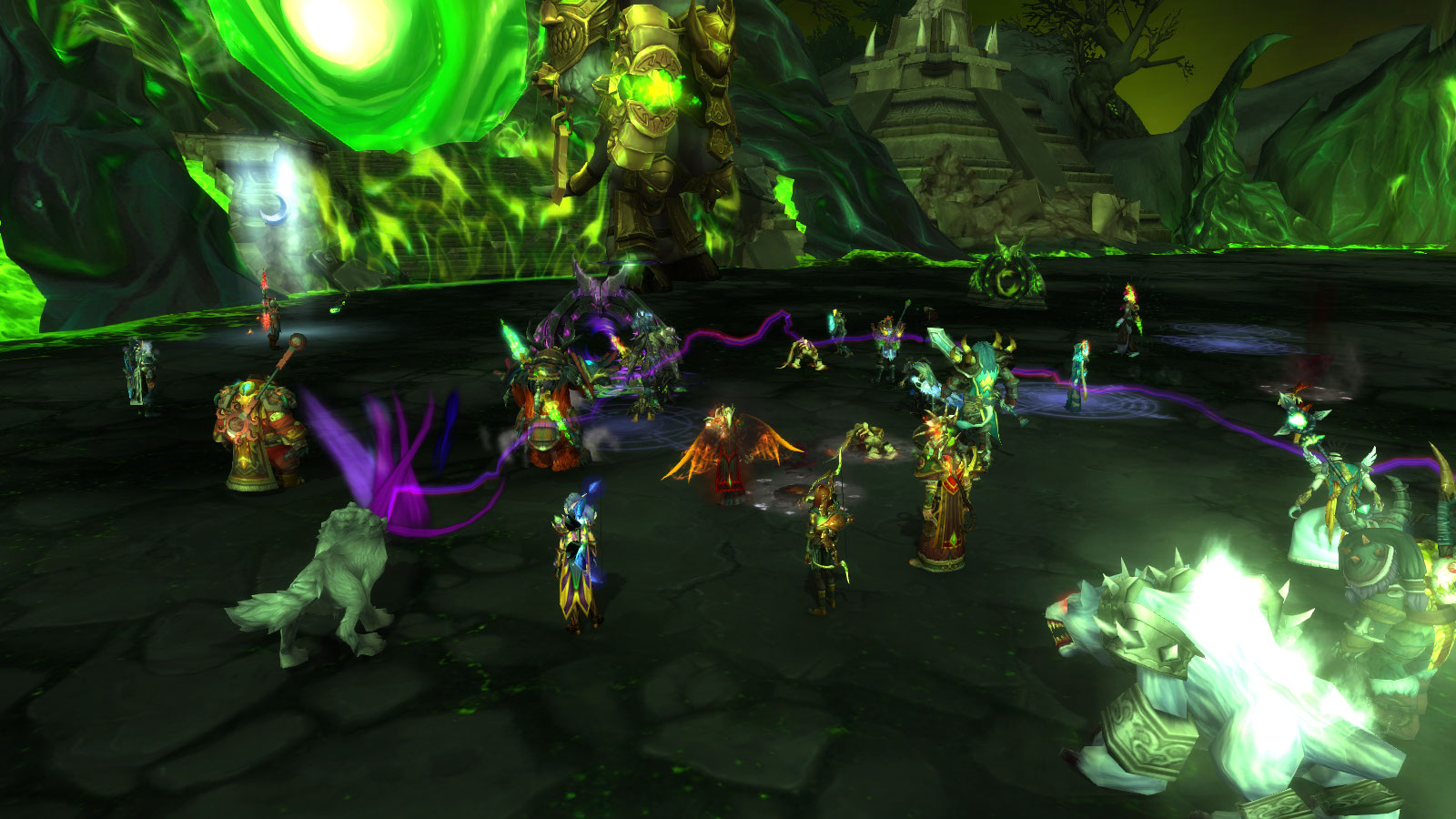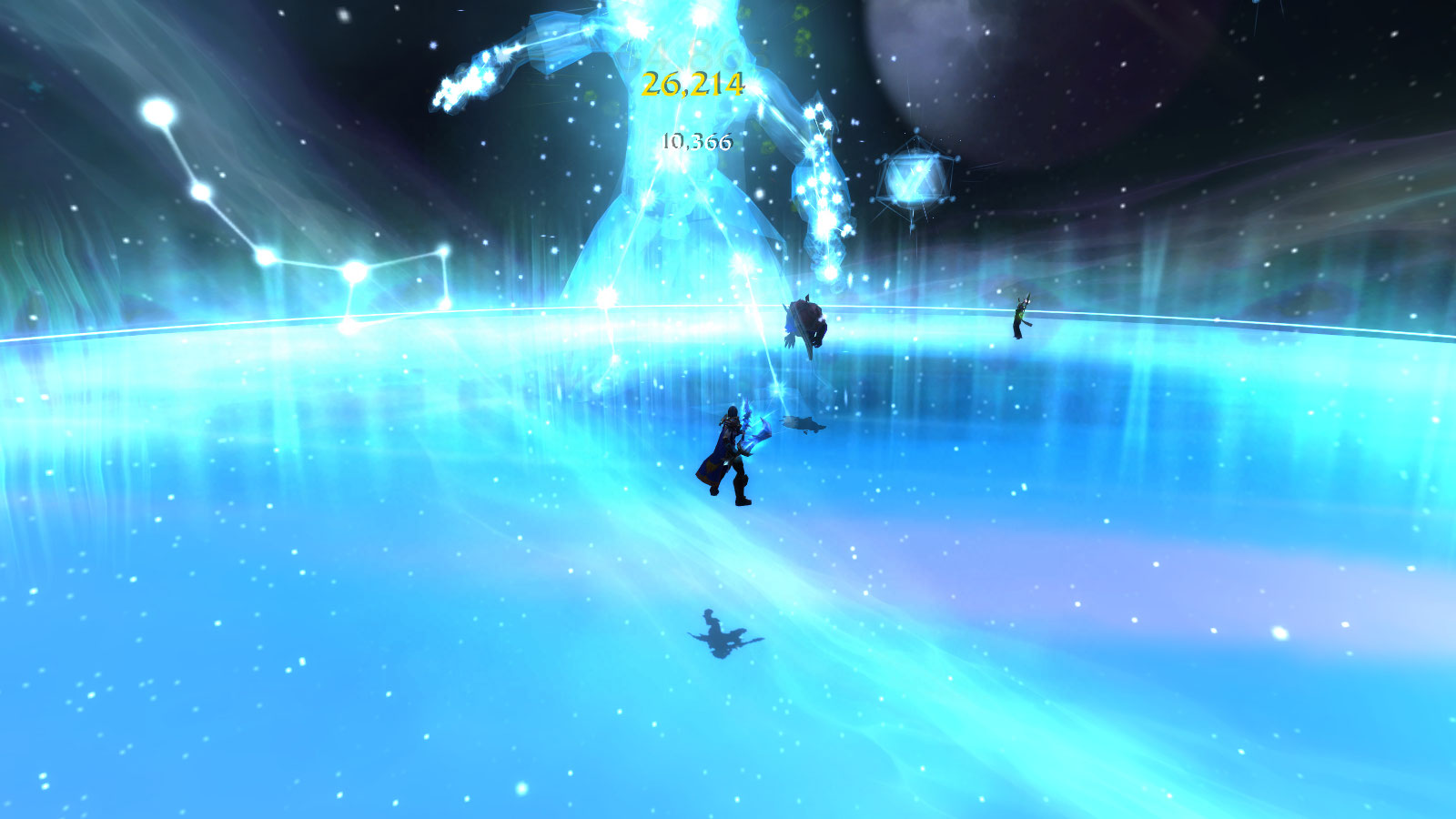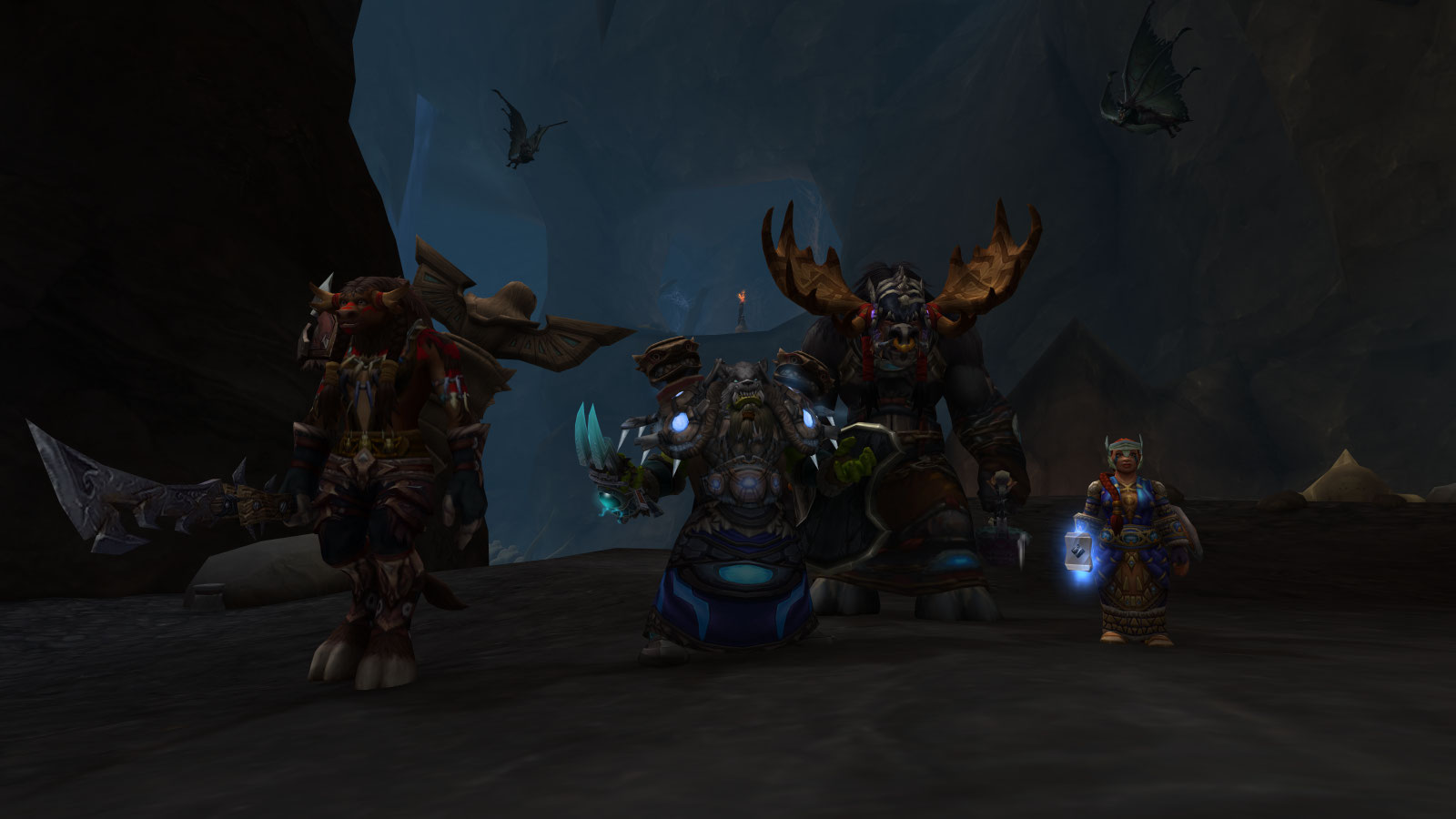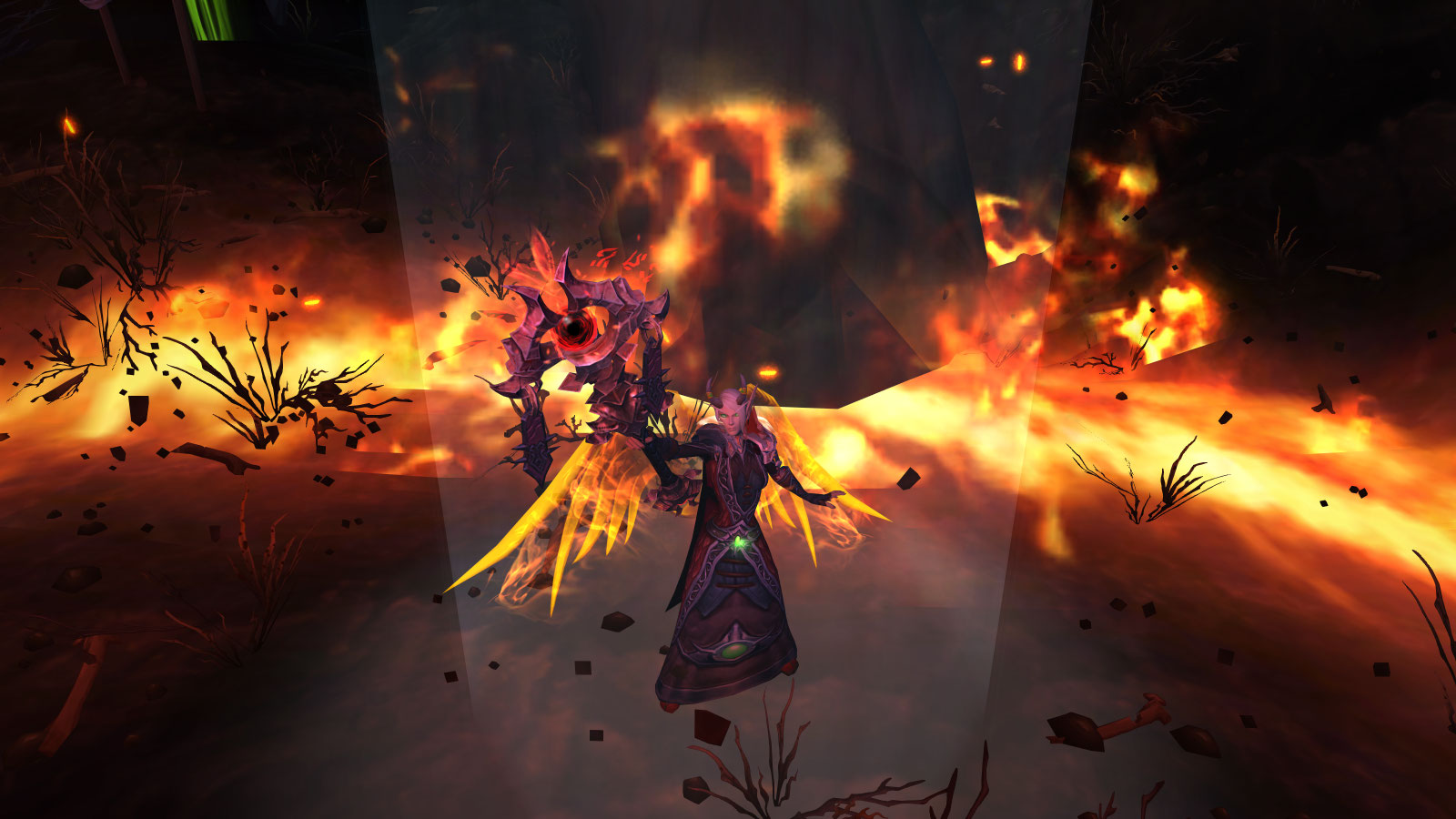
It is by now clear that World of Warcraft‘s Dragonflight expansion hasn’t exactly set the world on fire. This has set off another round of the MMO community’s favourite gameshow, “Why Is World of Warcraft Declining?”
A lot of people point the finger at raiding and Blizzard’s willingness to neglect the rest of the game in favour of it. And if this were still 2010, I’d agree with that, but these days I don’t think things are quite that simple.
First, a bit of background. In case the headline has you thinking I’m a hardcore raiding fan, let me disabuse you of that notion right away. My experiences with traditional raiding were few and often unpleasant. I subjected myself to them because I’m a story fan first, and the most important story moments of World of Warcraft are told in raids, but it always felt like a chore, and I never got what I wanted from the experience.
In Wrath of the Lich King, my small guild made some effort at raiding Icecrown Citadel, but we never made it past the first wing before I quit to play StarCraft II until Cataclysm. We made some attempts at proper progression raiding in Cataclysm, and I tried to PUG raids occasionally, but those experiences mostly ended in disaster. And I won’t even get into the endless scorn heaped upon me and players like me by the most vocal elements of the raiding community.
Then, at last, my prayers were answered: the Raid Finder arrived. We had finally come to a point where basically everyone could see the full story of an expansion play out, without all the struggle and inconvenience normally associated with raiding.
In fact, while the Raid Finder is technically a form of raiding, I don’t think it should be lumped in with raiding as a concept. I would argue it has far more in common with Guild Wars 2‘s open world zergs than it does with traditional progression raiding. It’s barely controlled chaos, far from the carefully organized world of traditional raiding.

I wouldn’t say the Raid Finder fixed everything, but it did relegate the raider vs. non-raider dichotomy to a position of much less significance. While it hasn’t been a straight upward trend, future expansions also provided new ways to cater to the more casual gamer. World quests provide repeatable solo content, and the quality of story quest design (from a technical standpoint if not always an artistic standpoint) only keeps getting better.
While I miss the convenience of Wrath‘s badge system, on balance the game is more accessible now than it was then. This is why I find it confusing that so much of WoW‘s recent criticism seems to be built around the premise that progression raiding is still the whole game or that Wrath was a golden age that we need to return to.
I do understand why this is a sore spot for a lot of people. Up until the end of the third expansion, you couldn’t even experience the game’s biggest story beats unless you part of a serious raiding guild, and there have been periods when if you didn’t raid, there wasn’t really anything else to do. Large sections of the raiding community also tend to display a rather vicious strain of elitism, so it’s easy to feel your hackles rising when anything is done to favour them, even when it’s something harmless like mythic raiders getting a tier set with a different colour scheme and a higher ilevel.
And I’m not saying everything is perfect now. The delayed rollout of Raid Finder wings is an example of blatant and needless elitism, and heroic dungeons, once a bastion of casual content, are a mostly ignored vestigial limb. There’s definitely room for a little less favouritism to be shown to conventional raiding and the similarly exclusive mythic dungeons and for more effort to be put towards solo and small group content.
I’m not saying that Blizzard’s favouritism towards raids and mythics isn’t a problem with the game. I just don’t think it’s the problem with the game.

Historically if you speak to the actual hardcore raiders that Blizzard is supposedly catering the game to, many will tell you that they feel too pressured to participate in non-raid content in order to keep their character optimal.
And that tells us what the real underlying issue is: Blizzard has a very specific view of how the game is meant to be played, and it relentlessly pushes people down that narrow path. While the current paradigm puts raiders at the top of the totem pole, there aren’t any players who really get to play how they want.
We’ve seen this time and again throughout the history of the game. We saw it in attempt to remove flying mounts and subsequent Pathfinder debacle. We saw it in the ungodly daily quest grind of Mists of Pandaria. We see it now in the devaulation of heroic dungeons in favour of mythic plus.
If there is a single flaw at the heart of World of Warcraft, it is that: a fundamental philosophical opposition to the concept of player agency.
But I think it may be a mistake to pin all of WoW‘s decline on any one issue. While some problems loom larger than others, I think the current state of the game may also be a case of death by a thousand cuts.
When I’ve thought about returning to WoW over the last few years, it hasn’t been raider favouritism or a lack of casual content that’s dissuaded me. It’s been more fundamental issues with the game’s design, such as Pathfinder and the new talent system.
I see the new talent system as a gigantic step back for the game, but even if you do feel it’s an improvement, it’s a problem that we’re still having to completely relearn our characters on a regular basis in a game that’s almost 20 years old.

This kind of chaotic design has defined WoW for far too long. It’s hard to become invested in anything because nothing lasts. My flying mounts get hobbled by Pathfinder. My favourite builds get rebuilt or lost entirely. My all-time favourite playstyle in this game was a Demonology Warlock circa Mists of Pandaria, and nothing even close to that build exists anymore. All its abilities were deleted or rebuilt into something unrecognizable just so there wouldn’t be thematic overlap with Demon Hunters.
Yes, balance changes must be made, and there need to be fresh options to keep veteran players engaged, but there needs to be stability, too. By contrast when I recently returned to Guild Wars 2 after about a decade away, almost nothing had changed about my characters. There were a few minor tweaks here or there, but nothing that required me to relearn them from scratch. Freshness came from elite specs, which offer different ways to play without replacing the core mechanics.
In its desperation to get more eyes on Dragonflight, Blizzard has sent me many offers of game time and expansion trials, and I have been quite tempted to take them up on some of these offers, if only to tool around with old content. But what stops me every time is the sheer effort it would take to wrap my head around the new/old talent system. I don’t want to have learn from square one again; I just want to play my old characters as I remember them.
It’s not that I don’t want to play WoW. It’s that the version of WoW I liked no longer exists, and the same is true for so many other players, I’m sure. There’s not even an easy way to correct that because there have been so very many versions of WoW over the years. Even with the advent of classic servers, there doesn’t seem to be a practical way to give everyone the version of WoW they want.
And the list of WoW‘s problems goes on. There’s also the fact the game is still charging a mandatory subscription fee, an increasingly unpopular business model in the games industry that has been all but abandoned by the wider MMORPG genre.
There’s also the ongoing scandals surrounding Blizzard, from Blitzchung to the sexual harassment problems. Among invested players like the kind of people who read and write for this site, these issues loom large. I suspect the average gamer is far less likely to take note, so I’m not sure these scandals have had a major impact on WoW‘s fortunes, but it surely hasn’t helped.

And even beyond all that, there’s the simple fact that the game feels tired creatively. I’ve always had lots of big problems with the game mechanics and management of WoW — be it raid or die endgames or Pathfinder or whatever — but I always kept coming back because I love the world and I was invested in the stories. I’ve long believed that an expansion with a sufficiently awesome story and theme could win me back, but it just hasn’t happened.
Lately it seems Blizzard is only capable of rehashing former glory. “Hey, look, the faction conflict again! Nevermind that we’ve provided satisfying resolutions to the faction conflict as far back as Warcraft III…” “Hey, look, dragons again! Nevermind that we already conclusively ended their story arc back in Cataclysm…”
Shadowlands felt a bit more original, but even it seemed to lean excessively hard on Wrath of the Lich King nostalgia. Playing to nostalgia can work, but it still has to be done with wit and creativity, and there’s been precious little of that from Blizzard lately. The recent expansions don’t feel inspired. They don’t seem to be born from passion, only from a desire to repeat past successes.
And finally, there’s the simple passage of time to consider. World of Warcraft is by now a very old game. There are people attending high school right now that weren’t even born yet when the game launched. Even if Blizzard had done everything right, the game’s population was going to start declining eventually.
Of course, Blizzard hasn’t done everything right, so we definitely can’t blame all of the game’s population losses on the march of time. But we can’t ignore it as a factor, either. If you’ll permit me to beat the dead meme: No king rules forever.
In the end, I don’t think there’s any one thing to blame for WoW‘s decline. Yes, Blizzard could do better at balancing the needs of raiders and non-raiders, but that problem has been far worse in the past, when the game was more popular than it is now. I fear that focusing on that to the exclusion of all of WoW‘s other issues risks ignoring the more fundamental problems that prevent the game from reclaiming its past glory.
 Everyone has opinions, and The Soapbox is how we indulge ours. Join the Massively OP writers as we take turns atop our very own soapbox to deliver unfettered editorials a bit outside our normal purviews (and not necessarily shared across the staff). Think we’re spot on — or out of our minds? Let us know in the comments!
Everyone has opinions, and The Soapbox is how we indulge ours. Join the Massively OP writers as we take turns atop our very own soapbox to deliver unfettered editorials a bit outside our normal purviews (and not necessarily shared across the staff). Think we’re spot on — or out of our minds? Let us know in the comments!














